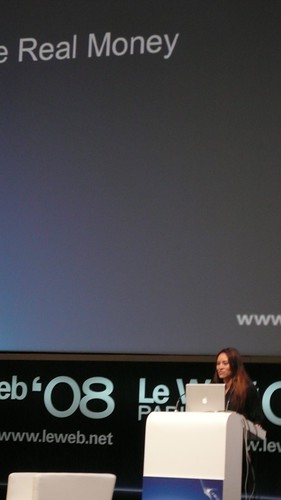
 Susan Wu is the CEO and founder of ohai. The topic of her presentation was “Virtual Goods Make Real Money”. The topic is hot, of course, in several ways. First of all we now have an economy of virtual goods at Facebook and several other social networks and in most online virtual worlds like Second Life. It is also hot because with the current economic situation everyone is eager to find out ways to make more money. We would all rather make real money than virtual money (we had enough of that in the previous bubble, thank you) but any money will do right now.
Susan Wu is the CEO and founder of ohai. The topic of her presentation was “Virtual Goods Make Real Money”. The topic is hot, of course, in several ways. First of all we now have an economy of virtual goods at Facebook and several other social networks and in most online virtual worlds like Second Life. It is also hot because with the current economic situation everyone is eager to find out ways to make more money. We would all rather make real money than virtual money (we had enough of that in the previous bubble, thank you) but any money will do right now.
Wu, a former Venture Capitalist, has a simple message: you can make a lot more money with virtual goods than you are currently doing. She starts of with a question: “Why would people spend hard earned cash on object that have no tangible substance”. First of all, we have many non tangible valuables in the real world. Like brands, knowlegde and money. Money, of course, being the most important of them all. Money is nothing but a representation of actual value.
There are three basic virtual goods. They are either Decorative, Functional or Behavorial, or a combination of these. People use virtual goods for several things:
1: Gifting (virtual cupcakes & champagne via Facebook & giving tips via TipJoy)
2: Time VS money tradeoff (buying a better or cooler character in a game)
3: To create real value.
4: Entrepreneurship opportunities. (sell and resell virtual goods)
If your users are interacting or building relationships you can monetize via virtual goods. Or at least, that is what Susan hopes will happen more. At least making money from virtual goods seems to be a saver bet than advertisement. People have proven to like virtual products as long as there are big enough groups to share them with. It might not be a shortcut to profitability to solvency for smaller start-ups but it would be exciting to think about what kind of virtual services Youtube, as an example, could sell us. Any ideas?
Get the TNW newsletter
Get the most important tech news in your inbox each week.




